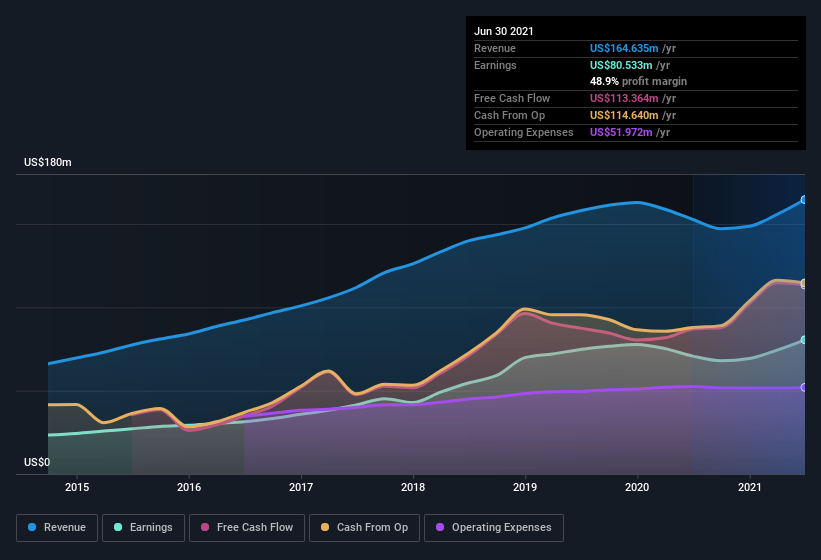If You Like EPS Growth Then Check Out Preferred Bank (NASDAQ:PFBC) Before It's Too Late
It's only natural that many investors, especially those who are new to the game, prefer to buy shares in 'sexy' stocks with a good story, even if those businesses lose money. And in their study titled Who Falls Prey to the Wolf of Wall Street?' Leuz et. al. found that it is 'quite common' for investors to lose money by buying into 'pump and dump' schemes.
In the age of tech-stock blue-sky investing, my choice may seem old fashioned; I still prefer profitable companies like Preferred Bank (NASDAQ:PFBC). While profit is not necessarily a social good, it's easy to admire a business that can consistently produce it. Loss-making companies are always racing against time to reach financial sustainability, but time is often a friend of the profitable company, especially if it is growing.
See our latest analysis for Preferred Bank
How Fast Is Preferred Bank Growing?
As one of my mentors once told me, share price follows earnings per share (EPS). That means EPS growth is considered a real positive by most successful long-term investors. Preferred Bank managed to grow EPS by 13% per year, over three years. That's a good rate of growth, if it can be sustained.
One way to double-check a company's growth is to look at how its revenue, and earnings before interest and tax (EBIT) margins are changing. Not all of Preferred Bank's revenue this year is revenue from operations, so keep in mind the revenue and margin numbers I've used might not be the best representation of the underlying business. While we note Preferred Bank's EBIT margins were flat over the last year, revenue grew by a solid 7.8% to US$165m. That's progress.
You can take a look at the company's revenue and earnings growth trend, in the chart below. To see the actual numbers, click on the chart.
The trick, as an investor, is to find companies that are going to perform well in the future, not just in the past. To that end, right now and today, you can check our visualization of consensus analyst forecasts for future Preferred Bank EPS 100% free.
Are Preferred Bank Insiders Aligned With All Shareholders?
It makes me feel more secure owning shares in a company if insiders also own shares, thusly more closely aligning our interests. As a result, I'm encouraged by the fact that insiders own Preferred Bank shares worth a considerable sum. Given insiders own a small fortune of shares, currently valued at US$79m, they have plenty of motivation to push the business to succeed. At 8.4% of the company, the co-investment by insiders gives me confidence that management will make long-term focussed decisions.
Should You Add Preferred Bank To Your Watchlist?
As I already mentioned, Preferred Bank is a growing business, which is what I like to see. If that's not enough on its own, there is also the rather notable levels of insider ownership. The combination sparks joy for me, so I'd consider keeping the company on a watchlist. We should say that we've discovered 2 warning signs for Preferred Bank that you should be aware of before investing here.
Although Preferred Bank certainly looks good to me, I would like it more if insiders were buying up shares. If you like to see insider buying, too, then this free list of growing companies that insiders are buying, could be exactly what you're looking for.
Please note the insider transactions discussed in this article refer to reportable transactions in the relevant jurisdiction.
This article by Simply Wall St is general in nature. We provide commentary based on historical data and analyst forecasts only using an unbiased methodology and our articles are not intended to be financial advice. It does not constitute a recommendation to buy or sell any stock, and does not take account of your objectives, or your financial situation. We aim to bring you long-term focused analysis driven by fundamental data. Note that our analysis may not factor in the latest price-sensitive company announcements or qualitative material. Simply Wall St has no position in any stocks mentioned.
Have feedback on this article? Concerned about the content? Get in touch with us directly. Alternatively, email editorial-team (at) simplywallst.com.

 Yahoo Finance
Yahoo Finance 
